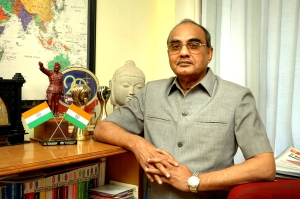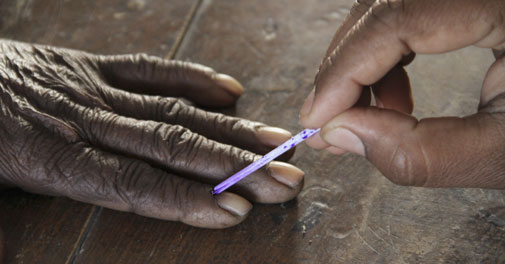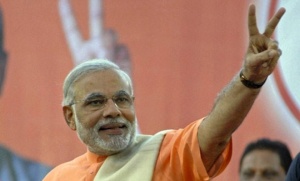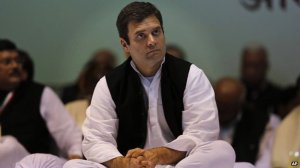
Chairman of the Centre for Media Studies (CMS)
Just concluded 2014 polls reminds uncertain trends that are acquiring threatening proportion effecting fundamentals of our democracy and good governance. The irony is that this is so at a time when the country is going through a demographic shift with more than one-third young becoming voters with higher levels of education, increased exposure to news media and activism of civil society. This contradiction brings out 13 initiatives for ushering in a new wave of democracy and governance in the country.
Not all the correctives needed in this context require legislative intervention. Some ofcourse do. Some others require initiatives and interventions by designated agencies within the existing provisions. Others require promotional efforts by political parties, civil society, media and government agencies. Importance and urgency of political reforms should lead to a paradigm shift in the electoral process and practices.
Essential first step
First, more than ten years ago when we (CMS was one of the agency) fought for disclosure of candidate’s background, including crime and assets at the time of filing nomination, we were hoping that such information in public domain will change voter preferences for better. Has it happened? We had two rounds of elections since for Lok Sabha and also for Assemblies in most States. News media widely covered these declarations from the affidavits. There is no evidence of much impact of all that. Nevertheless that was an essential first step towards much needed transparency in politics and for electing better representatives. But we need to understand why that landmark decision of declaring details by candidates at the outset has only added to the rhetorics. What else or what more could be taken up to see that candidates are voted on the basis of their credentials
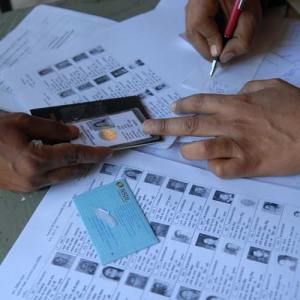
Picture courtesy Google Image
Criss Cross between parties
Second, defections in legislatures from one party to the other after getting elected have been more after the anti-defection law. We thought days of ayarams and gayarams have gone. Instead, Individual defections have been replaced by group defections. Infact, never before so much cross overs were there between political parties at national level and in the states as of 2014. In Andhra Pradesh Assembly alone, for example, more than hundred legislators crossed over to some other party since 2009. Quid-pro-quo is so obvious in the process. And sanctity of elections itself is getting eroded. Parties and voters do not seem to think that such criss crossing need to be discouraged for better politics in the country. How can such a trend be curbed and prevented?
Mounted expenditure for elections
Third, mounting election expenditure in the country and increasing cost of fighting an election at every level has been brought out by CMS. The way the poll expenditure is multiplying should scare the country. It is already vitiating free and fairness of polls. This is bound to deprive good governance to citizens. Can we ever address the menace of corruption in the country? In fact, this expenditure is the source of all corruption and outlet for black money. Unless we find ways of keeping expenditure in elections at minimum, democracy in India could only be a mockery. Now in 2014 news of false affidavits about assets and campaign expenditure by candidates are all around. Supreme Court has advised the Election Commission last week that it has power to unseat such a candidate. With corporates entitled to spend 7.5 percent of their net profits for political funding from 2014, what is the message? Should we allow elections be reduced to ‘paisa ke khel’ instead of being nucleus for participatory democracy?
Inner party democracy!
Fourth, without ensuring inner party democracy can we expect to bring in sane politics and better governance? Although Election Commission made impressive initiatives in bringing efficiencies in managing the polls, it made no difference in the modus operandi of political parties and their process of selecting candidates at any level. Most parties do not even comply with their own party constitution and transparency norms and rules, and yet EC cannot do anything to make them comply. Not one party had been deregistered. Is it to do with powers, or compliance of laws, or is it not realizing the seriousness and significance?
RTI wonder drug?
Fifth, political parties are missing an opportunity of rejuvenating themselves by keeping outside the purview of RTI Act. I had argued why it is in the best interest of parties, poll process and over all cleansing and consolidation of democratic roots. We need to bring in political parties under this wonder legislation. Parties could come up and argue that certain poll strategy related aspects could be exempted. My paper on the subject written a year ago explains the compulsions. Public pressure need to be kept up before the next Government too thinks of an amendment of the Act.
Representative character
Sixth, representative character of our elected representatives calls for critical appraisal and urgent correctives. This is not merely in terms of local residence, but as to votes secured to get elected. The way the parties select their candidates is not conducive to ensure local concerns all through the five year period of office. Winnability is an outdated idea but is being relied. No wonder why basic concerns of people (to do with drinking water, roads, sanitation, etc) remain on paper and as statistics? All because of decline in the representative character of elected reps all across. Have we realized this sufficiently?
Conflict of interest of elected representatives
Seventh, conflict of interest of elected representatives is so blatant in many cases and yet there is nothing to prevent scope for misuse of public office. What is at stake is accountability of representatives elected for service with an inherent notion of sacrifice. A CMS study on sitting MPs two years ago brought out that nearly one-fourth of them could be named for conflict of interest involving business, industry, trade, etc in their indulgence in the activities of the House as per their own declaration. Getting elected using resources much beyond the limits and then indulge in activities to multiply assets appears to be a modus operandi of some elected reps. There has to be limits on such priorities. Increasing transparency alone may not be enough. How can checks and balance principle be brought in?
Incumbent advantage!
Eighth, abuse of office for incumbent advantage is so blatant at the Union and in the States. This is despite there is no convincing evidence in the past that such misuse of office, pays off at the polls. The present cut-off date of Election Commission is not minimizing the scope for such efforts of incumbent parties. What is the experience of other countries in this regard? Increasing the period of model code much beyond has its pros and cons. The hurry with which UPA Government and State Governments went viral with advertisement campaigns all over is one thing. But worse is literally pushing decisions with consequences to nation and future just a couple of days before the poll code comes into effect. Should this be allowed? Is that not setting a bad start of a poll campaign and a bad precedent for the next Government?
Poll surveys in news media
Ninth, poll eve surveys have become contentious for some time. With political parties and news media taking to such polls, they have proliferated more recently to the extent of threatening the very free and fairness of electoral process in the country. And yet the EC maintains that it cannot do anything about when it is its mandate to ensure polls are free and fair. When it can stop major schemes of the government to do with economy, why it cannot take initiative with regard to these poll surveys? I have been writing about poll surveys for over two decades and in fact brought out a decade ago that poll surveys do influence poll process and even the outcome. Interestingly, it was a lapse (or a clerical error or an oversight) on the part of EC officials a couple of years ago when they filed for ban of surveys. Instead of mentioning “poll eve surveys” to mean both “pre-poll” and “exit poll surveys”, they mentioned “exit polls”. Limiting the ban only to “exit polls” in a nine phased poll schedule allowing “pre-poll surveys” flood the poll scene, is only half hearted effort. Linking poll surveys to freedom of press should not mean that independence of elections is not as important when in fact both are two sides of same coin of democracy. Pre-poll surveys too should not be featured in news media once after the code comes into effect, not just 48 hours before the poll day. There is so much gang up (or conflict of interest) to proliferate this Rs.100 crores business (estimate for 2014) of conducting all kind of surveys for candidates, parties and media – all to vitiate the process in one way or other.
Paid news is a larger menace
Tenth, paid news is not a discovery of EC, but it has opened up a pandora’s box. As a hidden phenomena it is all pervasive for much longer in the media of the country. Now it is a symptom of a larger malice to do with media policies in the country over the years. If political parties can own and control news media, how can they be restrained from availing opportunities to influence public opinions? And media becoming a profit maximizing enterprise, instead of an essential service function, can a code of conduct be brought in for media same way as for political parties, candidates, bureaucracy and government agencies. EC’s initiatives in this regard could only be a essential first step. Writing about paid new (The Hindu, January 20, 2010 “Paid news, a deep-malaise”) I suggested multiple initiatives. EC is taking a limited view from an “expense” point of consideration. EC should demonstrate its responsibility now that Supreme Court has reminded its power to disqualify violators of codes including ceiling on expenditure.
Luring voters!
Eleventh, freebies in galore and note-for-vote have become the modus operandi of poll times in the country. Freebies are what parties and candidates formally offer free if come to power. Consumable, households, durables and the like going beyond welfare and equity concerns. Then ofcourse lure of cash which individual candidates informally distribute on poll eve. This phenomena has become alarming and all across. Until recently this practice was threatening proportion in a couple of States in the South, now in 2014 it caught on the States in the North where muscle power has been replaced with money power in elections to the extent of vitiating the very process. And yet what we see in news media is some instances of unaccounted money in transit being confiscated running into a few hundred crores. But there seems no restrain on that practice. On the contrary, despite initiatives by the EC, the expectation of voters for such lure are multiplying from election to election. This cannot be the concern and task of EC alone. This has to be of everyone in the country. Media coverage of these instances instead of pointing an erroneous nature and its implications, giving a boost to the phenomena as if internalizing the practice as a necessary (evil) to fight a poll.
An alternative electoral system
Twelfth, has the first past the post system of elections out lived in the country? Is it time to look for alternatives where level playing is ensured, elected posts remain public offices for service, and ensure that elected reps remain accountable. If political parties cannot ensure inner party democracy, perhaps it is better that we have party less candidates in the elections. I remember not long ago elections for local governments were held without party labels and where money was not everything and when disputes and divides between party leaders were less at Panchayat level.
War of words
Thirteenth the tenor of campaign speeches of leaders in election campaigns call for a critical look. Firstly, poll speeches were more personal accusations with abuses of each other rather than on issues or propositions. Second, the language used reflects the kind of impatience and intolerance that leaders have to each other. Belittling each other using “inflammatory” language has become common, despite Election Commission’s notice in a few isolated cases. This has become an easy way to provoke and get public attention, particularly increased media space. Thirdly, those who get elected using such language and personal accusations, could they be expected to behave better on the floor of the Assemblies? News media has an active role in this regard and, in fact, can do much more than the Election Commission. They could discourage such a trend by not covering such statements.
With corporates formally providing funds for parties and candidates and political parties entitled to own and run news media, are we (innocently?) formalizing quid-pro-quo politics in the country? And also conflict of interest of elected reps, and yet expect elections as independent, free and fair? What kind of checks and balance system can we have to ensure? News media could do far more in respect of many of these threats.
***
Dr N Bhaskara Rao, is founder Chairman of CMS and a pioneer in studying polls and political campaigns for over last four decades; E. nbrao@cmsindia.org
